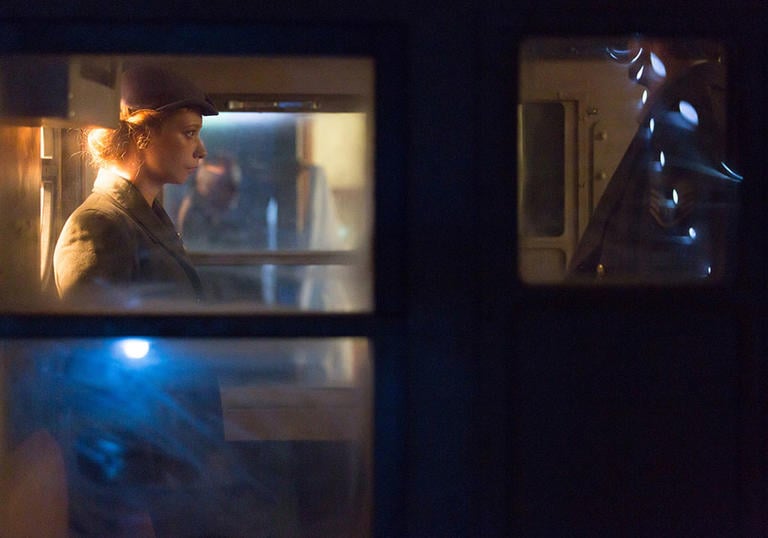Following her highly-acclaimed production of Luigi Nono’s Al gran sole carico d’amore in Salzburg’s Felsenreitschule in 2009, Katie Mitchell returned to the festival with the world premiere of the play The Forbidden Zone on the Perner Insel in 2014. Back then, we had the opportunity to live stream the performance from Salzburg but now, The Forbidden Zone arrives on our stage.
David Tushingham spoke to Mitchell ahead of its premiere in Salzburg.
What can you tell us about 'The Forbidden Zone'?
The production is a live cinema show with five video cameras, a moving subway train and several other film sets. It tells the story of the Haber family focussing on two women – Clara Immerwahr and her granddaughter, Claire Haber. It explores the relationship of these two women to war and the use of chemical weapons.
What drew you to the story of Clara Immerwahr?
When I was asked to direct a production for the Salzburg Festival to commemorate the outbreak of the First World War I was immediately very keen to find a story that focussed on women’s experiences in that war. It has been called the ‘Chemists War’ and Clara Immerwahr was at the centre of one of its defining events – the introduction of poison gas. She was the first woman to receive a PhD at the University of Breslau, a chemist who gave up her career when she married Fritz Haber. Haber was a Nobel Prize winning chemist who won the arms race to weaponise chlorine and phosgene gas and oversaw gas attacks in Ypres and elsewhere. This was the first weapon of mass destruction and opened the door to ever more devastating devices.
Clara argued with Fritz, calling his involvement with poison gas ‘a perversion of science.’ Following the assault in Ypres, a party was thrown in Fritz’s honour. Clara argued with him again and, that night, took his service revolver and shot herself in the heart.
Her death is the source of much controversy as no autopsy was ever performed and no suicide note was ever found. At the time her death was barely documented, her vehement protests against chemical warfare were unreported. Since then her death has been largely forgotten and those who have mentioned her attribute her suicide to depression or Fritz’s infidelity. Part of our intention in presenting this work is to rehabilitate Clara’s death as a political protest.
In researching the Haber family we discovered that Clara and Fritz’s grandchild Claire Haber also became a chemist and was studying antidotes to phosgene gas at the University of Chicago. Like Clara, Claire took her own life. We decided to make a multi-strand film which incorporated Claire, Clara, Fritz and others into a narrative which took place in several countries and at different moments in history.
You are creating this project together with Duncan Macmillan –
Duncan is an extraordinary collaborator and a brilliant writer, with a rare combination of dramaturgical precision, lean dialogue and a poetic lyricism.
Not for the first time, you are creating a theatre production which includes a great deal of filming live on stage. Why did you choose this form for this particular subject?
Much of the imagery of the period has lost its impact, becoming ubiquitous or cliché. The challenge is to find a form with which to look at the war anew. The presence of the cameras prevents the work from ever simply being imitative, and yet the projected film captures the period with a level of detail which isn’t possible in another form. The live cinema form also allows a degree of access to the thoughts of the characters which is crucial to capture these intelligent, angry, courageous women.
A leading historian recently described the origins of the First World War as ‘a play with only male characters’. Do you agree with this statement?
It was a primary intention to redress this attitude. It’s difficult to research women’s experiences from this period as the recorded history is predominantly male. Much of what represents ‘women’s experience’ from this time is poetry about staying at home while loved ones are away fighting which, for my taste, is a little passive and flowery. But there are countless examples of extraordinary, brave, intelligent and active women who have been utterly marginalised by the partial reading of history. The work on this project has deepened my understanding of this war and strengthened my pacifism.
Why did you choose the title 'The Forbidden Zone'?
The title comes from Mary Borden’s great work. Borden was another fascinating character from the period – an American who used her own money to equip and staff a field hospital at the front. She served as a nurse herself and during her time wrote prose and poetry about her experiences. The title is a homage to Borden and her work appears in the production.
What would you like the audience to feel at the end of the performance?
Fucking sad about violence, determined to be future pacifists and angry at the way in which women’s voices are not always heard in debates about war and weaponry.

